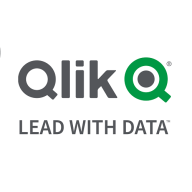

Qlik Replicate and SnapLogic both operate in data integration and management, competing in the realm of data transformation and automation. SnapLogic seems to have an edge due to its user-friendly platform and low-code development features, which enhance deployment speed and navigate high-volume transfers without intensive code requirements.
Features: Qlik Replicate stands out with its Change Data Capture (CDC) capabilities, near real-time data processing, and wide-ranging connector options. It excels in data management and automation but shows stronger AI functionalities in Qlik Sense. SnapLogic emphasizes low-code development and rapid deployment with its wide array of connectors, making it suitable for big data tasks. Its platform is noted for being highly flexible and integrating AI-enhanced functionalities, making it appropriate for scalable solutions.
Room for Improvement: Qlik Replicate could improve with a more intuitive interface and better quality support. Enhancements in error messaging, speed under complex settings, API flexibility, and cost transparency are needed. SnapLogic requires better data flow transparency, effective large dataset handling, and strengthened connectors. Additionally, API management and more pre-built integrations could further align the platform with user demands.
Ease of Deployment and Customer Service: Qlik Replicate supports flexible deployments on-premises and hybrid cloud setups, although inconsistencies in customer support have been noted. SnapLogic predominantly uses public and hybrid cloud deployments, providing easy configuration and integration. However, better responsiveness and clarity in their support services are necessary, as current offerings might not sufficiently address complex needs. Both platforms show variability in customer service quality and responsiveness.
Pricing and ROI: Qlik Replicate is perceived as costly, especially for smaller businesses, with a core-based licensing model. Despite the high cost, it offers significant ROI through reduced database usage and operational costs. SnapLogic presents tiered pricing that allows scaling based on use, generally seen as reasonable within its market segment, though its recent AI feature integrations have escalated costs. While it offers solid value considering its functionality, making price comparisons with competitors is recommended. Both platforms demonstrate substantial ROI by reducing manual processes through automation.
I conducted a cost comparison with the AWS service provider, and this option is much cheaper than the Kinesis service offered by AWS.
Even priority tickets, which should be resolved in minutes, can take days.
The technical support from SnapLogic is excellent, and I would give it a complete ten.
I rate the scalability of SnapLogic as eight out of ten.
I would rate the stability of SnapLogic as nearly ten out of ten.
It is a core-based licensing, which, especially in the banking industry, results in the system capacity being utilized up to a maximum of 60%.
If the AI capabilities and integrations were more intuitive and easy to learn for new users, it would be greatly beneficial.
I tend to frequently communicate with SnapLogic to ask for additional features, and they have been responsive.
Licensing is calculated based on the machine's total capacity rather than actual usage.
There would be only one point of improvement if the price could be lower.
SnapLogic is positioned at around seven or eight out of ten in terms of pricing.
Data retrieved from the system can be pushed to multiple places, supporting various divisions such as marketing, loans, and others.
I also like the whole child-parent pipeline feature; it allows me to break up a process into smaller pieces and then have one big pipeline that controls these smaller pipelines.
I find SnapLogic to be user-friendly, especially for beginners with limited experience in data engineering or ETL.


Qlik Replicate is a data replication solution for replicating data from one source database to another for business intelligence software. It offers data manipulation and transformations, replication without impacting source databases, and ease of use without needing ETL. The solution is stable and user-friendly, with detailed logging and support.
Qlik Replicate has improved the organization by allowing each team to replicate their data into a single-source data location. The most important feature of Qlik Replicate is its ability to replicate and update records without needing a programmer.
The SnapLogic Intelligent Integration Platform uses AI-powered workflows to automate all stages of IT integration projects – design, development, deployment, and maintenance – whether on-premises, in the cloud, or in hybrid environments. The platform’s easy-to-use, self-service interface enables both expert and citizen integrators to manage all application integration, data integration, API management, B2B integration, and data engineering projects on a single, scalable platform. With SnapLogic, organizations can connect all of their enterprise systems quickly and easily to automate business processes, accelerate analytics, and drive transformation.
We monitor all Data Integration reviews to prevent fraudulent reviews and keep review quality high. We do not post reviews by company employees or direct competitors. We validate each review for authenticity via cross-reference with LinkedIn, and personal follow-up with the reviewer when necessary.